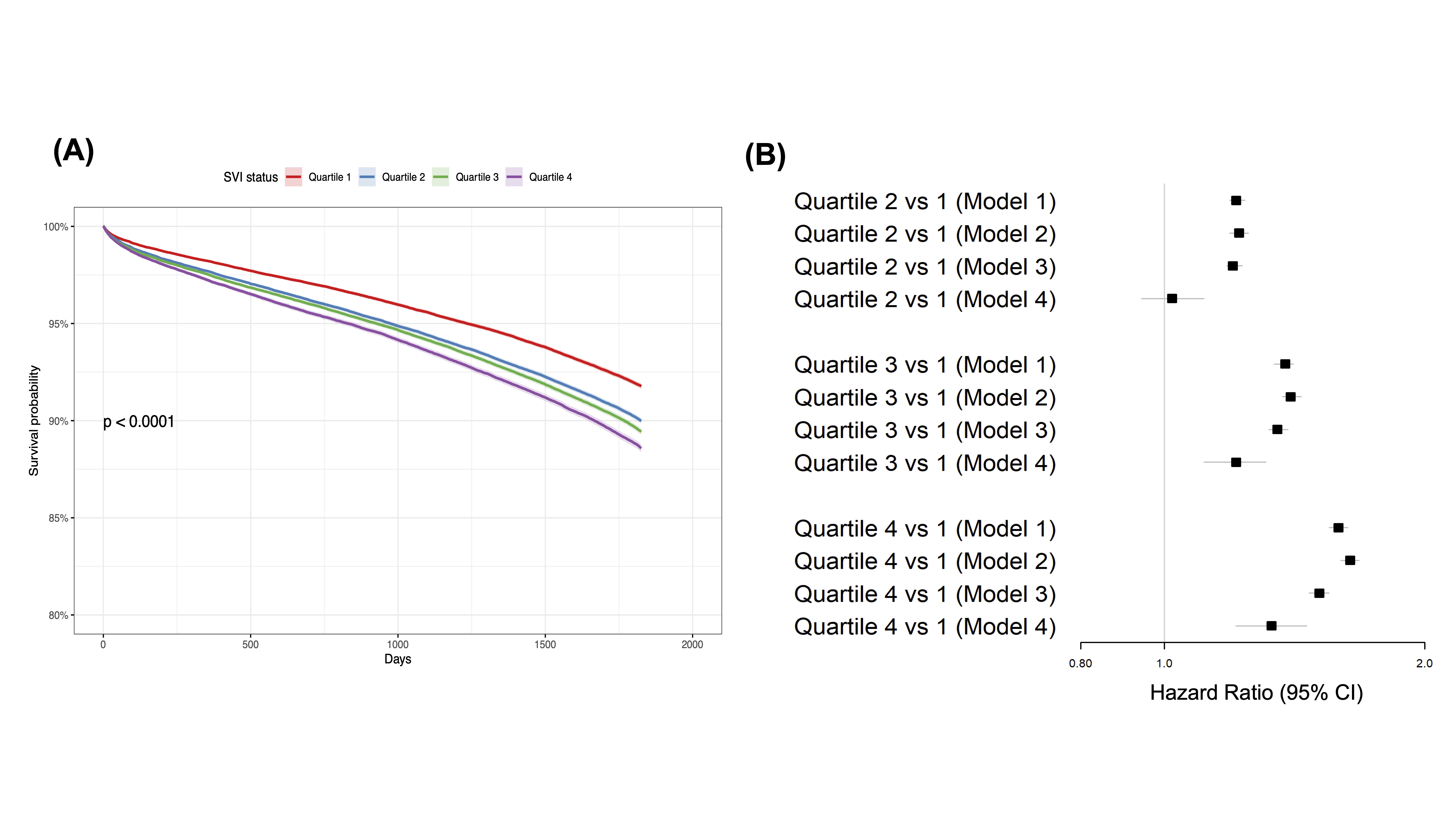Final ID: MP-20
Leveraging Electronic Health Records to Assess Neighborhood Advantages and Risk of Cardiovascular Outcomes Among Hypertensive Patients
Abstract Body: Introduction: Hypertension disproportionately impacts socially disadvantaged groups in the U.S. with increasing prevalence and suboptimal control rates. Our study aims to examine the association between neighborhood-level social vulnerability and hypertension outcomes using electronic health record (EHR) data from a large regional health system.
Methods: We conducted a retrospective analysis of EHR data from the Sentara Health System, covering the period from January 1st, 2010, to December 31st, 2022. We assigned a Social Vulnerability Index (SVI) based on the residential census tract of each patient and established a longitudinal cohort of patients who consistently utilized healthcare services. To be included in the study, patients were required to have a minimum of five years of observational time and to have healthcare visits in at least 50% of the observed years. The study focused on patients diagnosed with hypertension—either through a hypertension diagnosis, a blood pressure measurement exceeding 140/90, or antihypertensive medication prescriptions. We utilized multivariate Cox Proportional Hazards models to analyze the associations of SVI with cardiovascular outcomes and blood pressure control (<140/90 mmHg).
Results: The longitudinal cohort consisted of 55,060 patients, with an average age of 54 years (Interquartile range: 42-65), 30.0% of whom were Black adults and 60.0% were females. Compared to patients residing in the most advantaged neighborhoods (quartile 1 of SVI), those in more disadvantaged neighborhoods (quartiles 2, 3, and 4) had hazard ratios for composite cardiovascular endpoint (myocardial infarction, heart failure, and stroke) of 1.22 (95% CI, 1.19-1.25), 1.40 (95% CI, 1.37-1.44), and 1.64 (95% CI, 1.60-1.68), respectively, after adjustment for age and sex. Additionally, blood pressure control was significantly lower in higher SVI quartiles, with control rates in quartiles 1 through 4 at 78.4%, 76.5%, 75.2%, and 72.8%, respectively (P<0.001). Among the SVI themes, socioeconomic status (theme 1) and housing type and transportation (theme 4) were associated with the highest hazard ratios for cardiovascular outcomes.
Conclusions: Neighborhood-level social vulnerability is significantly associated with worse hypertension control and adverse cardiovascular outcomes. Health systems can employ tailored interventions targeting high-risk neighborhoods to reduce disparities and enhance health outcomes for vulnerable populations.
Methods: We conducted a retrospective analysis of EHR data from the Sentara Health System, covering the period from January 1st, 2010, to December 31st, 2022. We assigned a Social Vulnerability Index (SVI) based on the residential census tract of each patient and established a longitudinal cohort of patients who consistently utilized healthcare services. To be included in the study, patients were required to have a minimum of five years of observational time and to have healthcare visits in at least 50% of the observed years. The study focused on patients diagnosed with hypertension—either through a hypertension diagnosis, a blood pressure measurement exceeding 140/90, or antihypertensive medication prescriptions. We utilized multivariate Cox Proportional Hazards models to analyze the associations of SVI with cardiovascular outcomes and blood pressure control (<140/90 mmHg).
Results: The longitudinal cohort consisted of 55,060 patients, with an average age of 54 years (Interquartile range: 42-65), 30.0% of whom were Black adults and 60.0% were females. Compared to patients residing in the most advantaged neighborhoods (quartile 1 of SVI), those in more disadvantaged neighborhoods (quartiles 2, 3, and 4) had hazard ratios for composite cardiovascular endpoint (myocardial infarction, heart failure, and stroke) of 1.22 (95% CI, 1.19-1.25), 1.40 (95% CI, 1.37-1.44), and 1.64 (95% CI, 1.60-1.68), respectively, after adjustment for age and sex. Additionally, blood pressure control was significantly lower in higher SVI quartiles, with control rates in quartiles 1 through 4 at 78.4%, 76.5%, 75.2%, and 72.8%, respectively (P<0.001). Among the SVI themes, socioeconomic status (theme 1) and housing type and transportation (theme 4) were associated with the highest hazard ratios for cardiovascular outcomes.
Conclusions: Neighborhood-level social vulnerability is significantly associated with worse hypertension control and adverse cardiovascular outcomes. Health systems can employ tailored interventions targeting high-risk neighborhoods to reduce disparities and enhance health outcomes for vulnerable populations.
More abstracts on this topic:
Documentation of Elevated Blood Pressure Measurements in the Emergency Department: Exploratory Analysis of Factors Associated with Discussion and Comparison to Other Settings
Chapman Cole, Faine Brett, Carter Barry, Talan David, Polgreen Philip, Polgreen Linnea
Blood Pressure Variability and Implications for Trial ScreeningSong Xing, Burns Jeffrey, Gupta Aditi, Supiano Mark, Conroy Molly, Chandaka Sravani, Abu-el-rub Noor, Young Kate, Mahnken Jonathan, Barlocker Jackson, King Jordan

